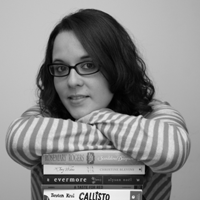I’m pleased to welcome author N.K. Traver to the blog today! Thank you, Ms. Traver for being here with us!

Amy: What is a standard day for you like in terms of writing?
N.K. Traver: I have the immense privilege of pursuing my writing career full-time right now, so an average day starts at 8 AM with a giant cup of coffee, a cat, my couch and my laptop. Morning until noon is reserved for writing – drafting, revising, or outlining – as I’ve found that’s when my brain works best. Afternoons are for networking, blog posts, email, critiques, reading, and any other writerly tasks that aren’t related to my current work in progress. I keep track of my writing progress on an actual paper calendar. I get a cupcake sticker for every 500 words.
Amy: What authors influenced you as a writer?
N.K. Traver: My childhood favorites were R.L. Stine (I think I’ve read EVERY Goosebumps book), K.A. Applegate, and of course, J.K. Rowling. As far as craft and style, I’d say Patrick Ness has been my biggest influence/inspiration. But I also love Laini Taylor’s beautiful imagery and Victoria Schwab’s complex villains.
Amy: How did you sign with your agent? What was it like when you got “the call” from an agent offering representation?
N.K. Traver: I won two online contests in the same month with DUPLICITY’s pitch and opening pages. My entry was posted for agent consideration, and I walked away with eleven requests that seemed too good to be true. It was a drastically different experience than I’d had with my first manuscript, that had flailed and drowned in the query world the year before. I stayed skeptical, until I got an email from one of the agents—a week later—saying she loved it and wanted to chat, and then I busted out some dance moves at the office.
“The call” actually caught me off-guard – I’d had a little back and forth with the agent beforehand, so I thought we were going to talk revisions. When she offered rep, I almost screamed. Somehow I kept my composure and had thankfully just saved my “call” notes to my Gmail account, else I would have been Googling “what to ask an agent who offers rep” in real time. I’ve been walking on air ever since.
Amy: What happened after you got “the second call”, this time from your agent letting you know there was an offer on your book?
N.K. Traver: That second call was so surreal. I’m not even sure what my agent said beyond “We have an offer.” I remember thanking her profusely and trying not to cry in front of my coworkers. My weird little idea was going to be a book. Not even -might- be a book at this point, it was -going- to be. I would be able to hold it in my hands and run my fingers down the pages. I would be able to go to Barnes & Noble and pick it up off the shelf. It still blows my mind.
Amy: Was the publishing process what you expected it to be? How did it differ from what you expected?
N.K. Traver: It wasn’t what I expected, but in the best way possible. I had done a ton of research ahead of time and knew, based on other authors’ experiences, that it could be months before I had an editorial letter or a contract. I had also braced myself to spend months revising. Within a week of announcing my deal, I had editorial notes. Four weeks later, I sent revisions to my editor, who approved them. I got my contract six weeks after that. And while I know this will differ book to book, it’s always nice to see it can work out faster than expected.
Amy: What advice do you have for aspiring authors?
N.K. Traver: Join Twitter immediately. Network with other querying writers, follow agents you admire, follow authors you love. Enter contests, lose contests, find critique partners whose work you can’t get enough of. Attend a local writing conference. And no matter what happens, keep going.
Amy: Can you tell us a little bit about your latest/upcoming release?
N.K. Traver: DUPLICITY is a YA cyberthriller pitched as Breaking Bad meets The Matrix for teens. It follows a morally-ambiguous computer hacker, Brandon, who’s sucked into a digital hell and replaced with a preppy Stepford-esque clone. It’s not yet available for preorder, but you can stalk it on Goodreads: https://www.goodreads.com/book/show/19237391-duplicity
You can find N.K. Traver here:
Twitter: https://twitter.com/NKTraver
Website: http://nktraver.com
Goodreads: https://www.goodreads.com/author/show/7501918.N_K_Traver




